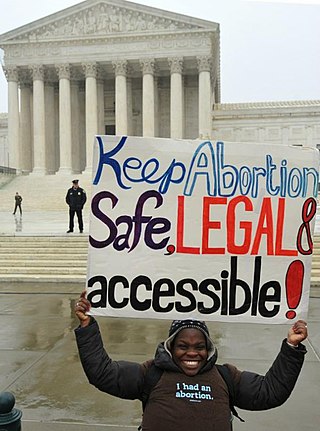
Compulsory sterilization, also known as forced or coerced sterilization, refers to any government-mandated program to involuntarily sterilize a specific group of people. Sterilization removes a person's capacity to reproduce, and is usually done by surgical or chemical means.
Criminal transmission of HIV is the intentional or reckless infection of a person with the human immunodeficiency virus (HIV). This is often conflated, in laws and in discussion, with criminal exposure to HIV, which does not require the transmission of the virus and often, as in the cases of spitting and biting, does not include a realistic means of transmission. Some countries or jurisdictions, including some areas of the U.S., have enacted laws expressly to criminalize HIV transmission or exposure, charging those accused with criminal transmission of HIV. Other countries charge the accused under existing laws with such crimes as murder, manslaughter, attempted murder, assault or fraud.
Eugenics has influenced political, public health and social movements in Japan since the late 19th and early 20th century. Originally brought to Japan through the United States, through Mendelian inheritance by way of German influences, and French Lamarckian eugenic written studies of the late 19th and early 20th centuries. Eugenics as a science was hotly debated at the beginning of the 20th, in Jinsei-Der Mensch, the first eugenics journal in the Empire. As the Japanese sought to close ranks with the West, this practice was adopted wholesale, along with colonialism and its justifications.

Secretary of the Department of Health and Community Services v JWB and SMB, commonly known as Marion's Case, is a leading decision of the High Court of Australia, concerning whether a child has the capacity to make decisions for themselves, and when this is not possible, who may make decisions for them regarding major medical procedures. It largely adopts the views in Gillick v West Norfolk Area Health Authority, a decision of the House of Lords in England and Wales.

Reproductive justice is a critical feminist framework that was invented as a response to United States reproductive politics. The three core values of reproductive justice are the right to have a child, the right to not have a child, and the right to parent a child or children in safe and healthy environments. The framework moves women's reproductive rights past a legal and political debate to incorporate the economic, social, and health factors that impact women's reproductive choices and decision-making ability.

The Human Rights Law Network (HRLN) is an Indian non-profit organisation founded in 1989 to protect the fundamental human rights and civil liberties of the most marginalised and vulnerable members of society. Working on the intersection of law, advocacy, policy, and education, HRLN is organised as a collective of lawyers and social activists dedicated to providing legal assistance to vulnerable and disadvantaged individuals, advocating for the implementation of structures to safeguard human rights and fight systemic oppression, and educating the public on their rights and remedies. HRLN provides pro bono legal services to marginalised groups, conducts investigations into human rights violations, and undertakes high-stakes impact litigation in service of the public interest. The organisation operates across the spectrum of public interest law, focusing specifically on children’s rights, rights of disabled persons, rights of people living with HIV/AIDS, prisoners' rights, refugee rights, rights of indigenous people, workers' rights, rights of minorities, and the protection of victims of sexual violence or trafficking.

The Supreme Court of Namibia is the highest court in the judicial system of Namibia. It is the court of last resort and the highest appellate court in the country. It is located in the city centre of Namibia's capital city, Windhoek. A Supreme Court decision is supreme in that it can only be reversed by an Act of Parliament that contradicts it, or by another ruling of the Supreme Court itself.

Eugenics, the set of beliefs and practices which aims at improving the genetic quality of the human population, played a significant role in the history and culture of the United States from the late 19th century into the mid-20th century. The cause became increasingly promoted by intellectuals of the Progressive Era.
African countries have been sites for clinical trials by large pharmaceutical companies, raising human rights concerns. Incidents of unethical experimentation, clinical trials lacking properly informed consent, and forced medical procedures have been claimed and prosecuted.

Madrigal v. Quilligan was a 1978 federal class action lawsuit from Los Angeles County, California, involving sterilization of Latina women that occurred either without informed consent, or through coercion. Although the judge ruled in favor of the doctors, the case led to better informed consent for patients, especially those who are not native English speakers.
This disability rights timeline lists events outside the United States relating to the civil rights of people with disabilities, including court decisions, the passage of legislation, activists' actions, significant abuses of people with disabilities, and the founding of various organizations. Although the disability rights movement itself began in the 1960s, advocacy for the rights of people with disabilities started much earlier and continues to the present.
After World War I, the Romani people in Czechoslovakia formed an ethnic community, living on the social periphery of the mainstream Czechoslovakian population.
N.B. vs Slovakia is the second case concerning forced sterilization of Romani people or Gypsy women from Slovakia decided by the European Court of Human Rights. The decision came only few months after the release of the judgment in the similar case V. C. vs. Slovakia. Once again, the Court unanimously found that the Romani woman had been sterilized without informed consent in contravention of Articles 3 and 8 of the European Convention on Human Rights.
HIV in pregnancy is the presence of an HIV/AIDS infection in a woman while she is pregnant. There is a risk of HIV transmission from mother to child in three primary situations: pregnancy, childbirth, and while breastfeeding. This topic is important because the risk of viral transmission can be significantly reduced with appropriate medical intervention, and without treatment HIV/AIDS can cause significant illness and death in both the mother and child. This is exemplified by data from The Centers for Disease Control (CDC): In the United States and Puerto Rico between the years of 2014–2017, where prenatal care is generally accessible, there were 10,257 infants in the United States and Puerto Rico who were exposed to a maternal HIV infection in utero who did not become infected and 244 exposed infants who did become infected.
Unethical human experimentation is human experimentation that violates the principles of medical ethics. Such practices have included denying patients the right to informed consent, using pseudoscientific frameworks such as race science, and torturing people under the guise of research. Around World War II, Imperial Japan and Nazi Germany carried out brutal experiments on prisoners and civilians through groups like Unit 731 or individuals like Josef Mengele; the Nuremberg Code was developed after the war in response to the Nazi experiments. Countries have carried out brutal experiments on marginalized populations. Examples include American abuses during Project MKUltra and the Tuskegee syphilis experiments, and the mistreatment of indigenous populations in Canada and Australia. The Declaration of Helsinki, developed by the World Medical Association (WMA), is widely regarded as the cornerstone document on human research ethics.
Sterilization law is the area of law, that concerns a person's purported right to choose or refuse reproductive sterilization and when a given government may limit it. In the United States, it is typically understood to touch on federal and state constitutional law, statutory law, administrative law, and common law. This article primarily focuses on laws concerning compulsory sterilization that have not been repealed or abrogated, i.e. are still good laws, in whole or in part, in each jurisdiction.

Under the administration of President Alberto Fujimori, Peru implemented a forced sterilization campaign as part of the National Population Program, primarily targeting impoverished and indigenous women in rural Andean regions. This effort, regarded as the largest state-sponsored sterilization initiative in the Americas, was publicly presented as a progressive strategy for promoting reproductive health and economic development. However, it has been broadly denounced for its coercive methods and associated human rights abuses.

Intersex people are born with sex characteristics, such as chromosomes, gonads, hormones, or genitals that, according to the UN Office of the High Commissioner for Human Rights, "do not fit the typical definitions for male or female bodies". Such variations may involve genital ambiguity, and combinations of chromosomal genotype and sexual phenotype other than XY-male and XX-female.
TheLegal Assistance Centre is a human rights organization in Windhoek, the capital of Namibia. The organization was established in 1988 during the apartheid era to litigate on behalf of people who were oppressed by the government and continues to operate today.
From approximately 2000, there was a controversy over the use of symphysiotomies during childbirth in the Republic of Ireland between 1944 and 1987. In 2002 an advocacy group called Survivors of Symphysiotomy (SoS) was set up in Ireland alleging religiously motivated symphysiotomies were performed without consent and against best medical practice in Republic of Ireland between 1944 and 1987. In 2014 Ireland agreed to pay women who received the procedure compensation without admitting liability. Some media reported that pubiotomy was also practised, but only one payout was given in 2014 for an "accidental" pubiotomy that occurred in the 1950s.









